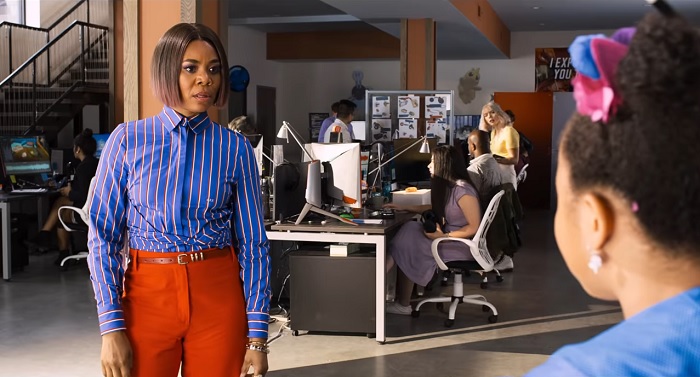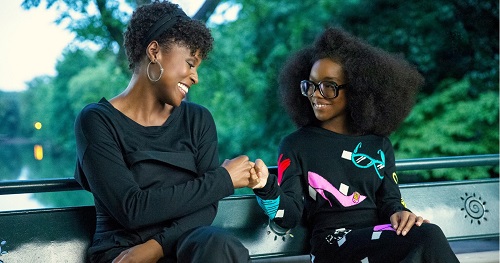

Spoilers: 'Little' is Mostly Great, So Why Include a Punching-Down Moment Involving a Child and Their Gender Identity?
By Roxana Hadadi | Film | April 15, 2019 |
By Roxana Hadadi | Film | April 15, 2019 |

There are many things to appreciate about Little, as Kristy noted in her review of the film.
A female filmmaking team is behind the movie, including director and writer Tina Gordon Chism (who also wrote Drumline, ATL, and What Men Want) and co-writer Tracy Oliver (who wrote Girls Trip and adapted the upcoming Yara Shahidi/Charles Melton vehicle The Sun Is Also A Star, the YA novel written by Nicola Yoon, of Everything, Everything).
The film’s cast is led by the inimitable Regina Hall, who had a career moment last year with Support the Girls, and gives Issa Rae of Insecure a chance to fully unleash her awkward charm on the big screen (that wasn’t really her function in last year’s The Hate U Give), and Marsai Martin fully comes into her own, delivering a star-making performance that demonstrates her years of work on Black-ish are just the beginning of her depths of talent.

All of that is good. The cast has great chemistry. There are obviously some scenes missing—like when Rae’s character April Williams and reverted-to-youth tech empress and horrible boss Jordan Sanders, played by Martin, are at a restaurant together having lunch. Jordan wants to drink but shouldn’t because she’s 14, and yet a scene later she’s commandeering a breadstick while hopped up on a bartop, belting out Mary J. Blige’s “I’m Goin’ Down.” A chunk of narrative is skipped here—I’m guessing they didn’t want to show young Jordan drinking, but she slipped some wine when April wasn’t looking, and she’s tipsily going down a lunchtime karaoke road?—but Martin and Rae gustily sing-battle into chunks of bread and tear the restaurant apart, and the scene is a crowd-pleaser.
Later on, Martin is ridiculously good in a scene where she tries to flirt with her flustered and confused teacher, Mr. Marshall (Justin Hartley, of This Is Us), who admits that he wants to quit his job but refuses to let Jordan sweet-talk him into being called by his first name during class. (Although it is great when Martin’s Jordan, Rae’s April, and the school’s principal collectively sigh “Gary” as he walks down a hallway.) And Hall, as she did in Support the Girls, toggles between strictness, rage, and tenderness with ridiculous ease.
Because fundamentally, Little is Jordan’s story, about a girl who grew up bullied and decided to become a bully and a boss to protect herself. She does despicable, terrible things, but the movie plays them for laughs, and it’s mostly fine because the characters adult Jordan targets can defend themselves. Rae’s April is her assistant, but she’s respected by everyone else who works at Jordan’s company, JSI, and she can speak back to Jordan in a way that no one else can. Jordan is terrible to her employees — SHE THROWS AWAY BOXES OF DOUGHNUTS! — but she seems to exist in a vacuum. She doesn’t fire anyone; it doesn’t seem as if anyone’s employment is actually threatened. She is revolting (when someone is trying to eat an apple during a meeting, she grabs it out of his hand, licks the whole thing, and then forces him to take a bite) and rude (mocking an employee’s weight and her need for anti-anxiety medication), but her abuse seems to roll off most people’s backs.
But: Little crosses a line, and that is when it punches down. For the most part, these are lateral punches in its approach to humor: adult to adult. And even when Hall’s Jordan mocks a young girl whose sort of adorably dorky antics remind her of herself, Stevie (Marley Taylor) sasses her right back, rightfully describing her as terrible and then cursing her with the spell that turns Jordan little. (Actually, the movie never really explores HOW Stevie has this power, but in a throwaway moment, she says she’s going to transform a young white boy into a marshmallow, and readers, I laughed.)
Before all that, though — in one of the film’s very first scenes — Hall’s Jordan is leaving her spacious condo. She had previously been grinding up against a guy in the building’s foyer area, in front of the elevator and in full view of the neighbor across the hall, described on IMDb as Mrs. Parker (Kausar Mohammed). Mrs. Parker is scandalized, and complains that Jordan should keep that sort of behavior inside her home — because it was inappropriate that it occurred in front of her daughter. The child shown is peering out from behind the condo door, with long hair; I can’t find a name for the child or for the actor or actress on IMDb. But instead of just saying something generally mean, like, “Your kid sucks” or whatever, the script has Jordan insist that the child is a boy. Jordan calls the child Mrs. Parker’s “son,” and when Mrs. Parker insists that the child is her daughter, Jordan says some other insulting things, ending with, “Oh, he’s transitioning?” Jordan then flounces back into her apartment, leaving the enraged Mrs. Parker and the child behind.
Uh. Yeah. That’s not good! Why make such an entirely unnecessary and mean-spirited transphobic joke? The movie goes on to demonstrate all the other ways that Jordan is terrible, and how much her outward anger is fueled by her deep pain from childhood bullying and pervasive loneliness. Was this particularly pointed exchange needed to drive that point home? At no other moment does Jordan exhibit any sort of specifically bigoted opinions — just a general hatred of other people, which collapses once she finds herself, naturally — so the moment also doesn’t jibe with the overall character. In the rest of the film, Jordan is cruel to nearly everyone she comes across, but they’re adults — or, in Stevie’s case, one particularly precocious child, who doesn’t mind going toe to toe with an adult — and they have the opportunity to fight back. Mocking a child for their gender identity and mocking a parent for wanting to defend their child is not great, not integral to Little (the child never appears again!), and an undeniable sore spot for a movie that does so much else right.
← 'A Song Of Vanilla Ice And Fire' Is Exactly What You Think It Is | Who is Mrs. Hinch? Instagram's Cleaning Influencer Explained →
More Like This
'The Gentlemen' Review: Ritchie's Latest Episodic Caper is a Blast for Fans of his Formula
Kristen Stewart's 'Love Lies Bleeding' Is Gonna Kick Your Ass And Make You Beg For More
What the Hell Is Going On in Apple TV+'s 'Constellation'?
‘Shōgun’ is TV’s Next Big Epic
It's Not the Filmmakers' Fault that Bill Belichick Sucks in 'The Dynasty: New England Patriots'

What’s Old Is New Again: Old Hollywood Glamour Glitters at the 2024 Oscars
Al Pacino Presents Best Picture Oscar, Confuses Everyone
The Dangerous Lie Of 'TradWives'
A Legendary Horror Franchise Is Headed To Television
'The Mandalorian' Season 4 Is Probably Not Happening
Halle Bailey On Why She Chose To Keep Her Pregnancy Private
More Like This
'The Gentlemen' Review: Ritchie's Latest Episodic Caper is a Blast for Fans of his Formula
Kristen Stewart's 'Love Lies Bleeding' Is Gonna Kick Your Ass And Make You Beg For More
What the Hell Is Going On in Apple TV+'s 'Constellation'?
‘Shōgun’ is TV’s Next Big Epic
It's Not the Filmmakers' Fault that Bill Belichick Sucks in 'The Dynasty: New England Patriots'
Reviews